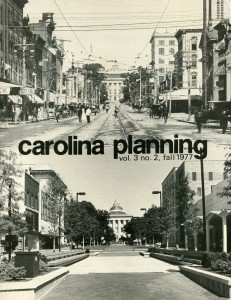 Volume 3.2 Community Development (1977)
Volume 3.2 Community Development (1977)
The Housing and Community Development Act of 1974 marked an important shift in federal housing policy. Cities receiving community development grants now have increased responsibility for, and freedom regarding, what they do with these allocations from the federal government. The growing emphasis on existing housing and neighborhood conservation over new construction has led cities to search for strategies appropriate to local neighborhood conditions. Community development has also brought a broader focus. Localities must think not simply in terms of physical structures, but of neighborhoods as total environments encompassing social and fiscal as well as structural concerns.
For localities to deal with community development, it is necessary to consider such questions as what is a neighborhood, and what strategies can be employed to deal with neighborhood change. Each city must have its own policy stands regarding such issues as attracting the middle class back into the city, increasing housing opportunities for the poor, and preserving historic structures. Much of this issue of Carolina Planning is devoted to providing community development planners with information that would be of use in making policy decisions and in designing strategies to deal with particular local situations.
Editors: Craig Richardson, Bruce Stiftel, and Ann Silverman
A digital version of this issue is available here.
| Historic Preservation & Urban Housing Policy
Chris Schubert Berndt The potential contribution of historic preservation to urban housing problems has been largely ignored. Preservation today is expanding traditional concerns to include relevant urban housing policy issues. A case study of Wilmington, North Carolina is examined as evidence. |
| A Housing Reinvestment Strategy for Durham, North Carolina
Seth Weissman Certain inner-city neighborhoods, while in need of preservation and improvement, have little market attractiveness. The author suggests a reinvestment strategy for a medium sized southern city which would stabilize the market and improve housing conditions. |
| Monitoring Change in Residential Neighborhoods
Ann Silverman Prevention of decline in residential neighborhoods requires a system of data collection. An understanding of neighborhood change process and recognition of availability and costs of data is important. The author develops a monitoring system and illustrates application in Wilmington. |
| Towards An Updated Approach to Neighborhood Planning
Alan Mark Richman Views of the neighborhood have changed substantially, and planning needs have also changed. Neighborhood concepts and needs are reviewed, along with planning requirements. Several models for planning are assessed. |
| Computers and Planning in Small Cities
Joseph Jay Many small planning agencies have not developed computer systems due to apprehension about high costs, increased manpower, and preconceptions. The author explains why these are fears more than facts, and describes benefits of in-house processing using Durham City Planning department experience. |
| The Distinction Between Economic Development & Economic Growth: Implications for North Carolina Development Policy
Mark Horowitz and Thomas Rogers The authors separate the determinants of wage into economic growth & development components and suggest the importance of development component in understanding cross-state wage differences. Find that North Carolina’s development policies focus more on growth than development. |